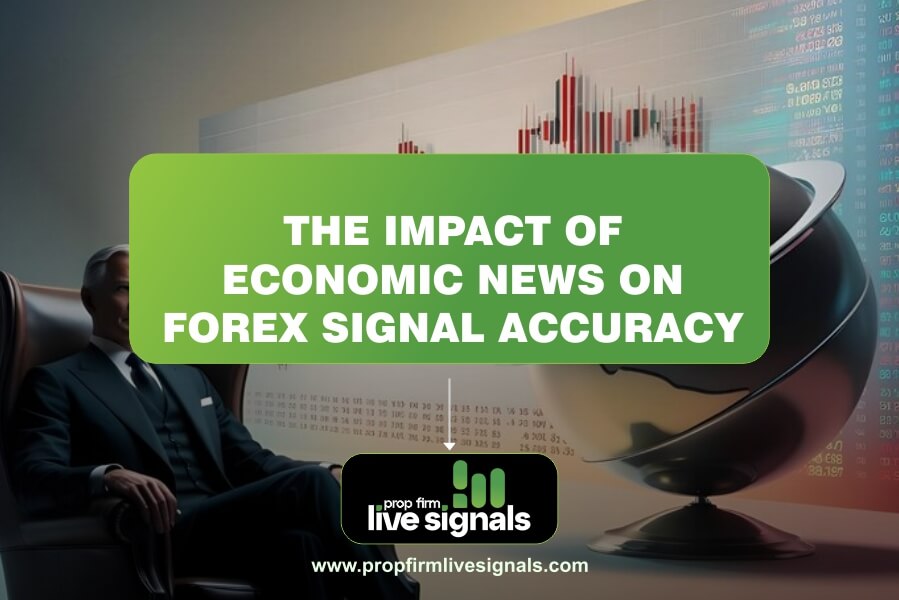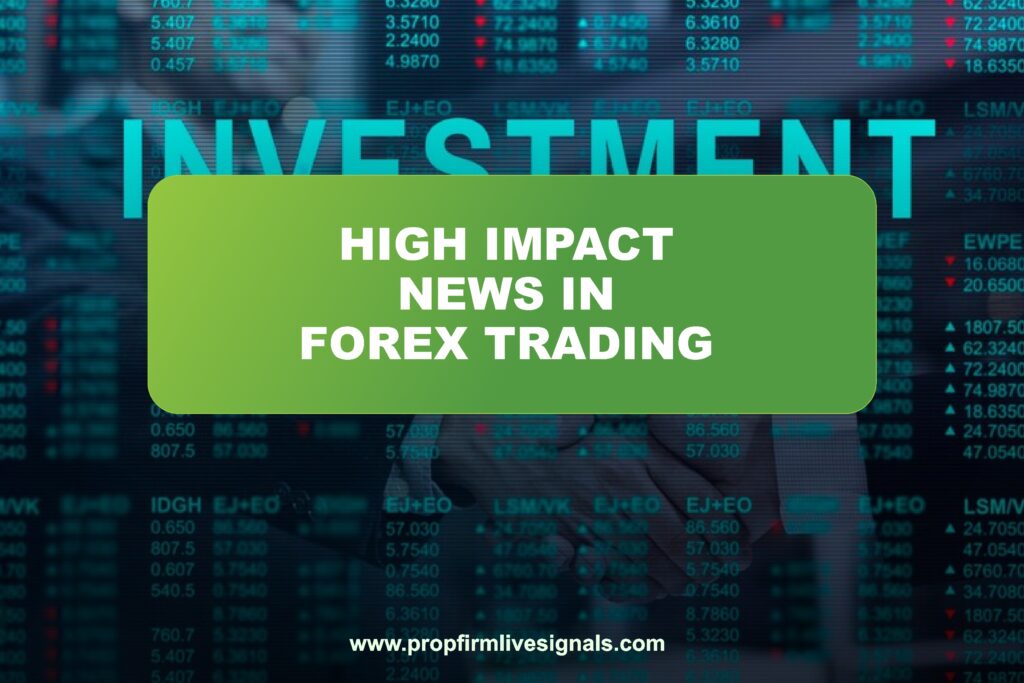This article examines the relationship between economic news and forex signal performance, offering key strategies for navigating turbulent market conditions.
Role of Economic News in Shaping Market Conditions
Economic news significantly influences market conditions, impacting trader sentiment, trends, and price movements. Key announcements like interest rate decisions, employment figures, inflation data, and GDP reports reveal economic health and potential central bank policy changes, often resulting in rapid market movements as traders adjust their positions in response. Good news usually creates bullish tendencies, while bad reports create bearish movements. In a liquid market, such as forex, this can be done in a split second, and this is what drives volatility with economic news. Consequently, it would be beneficial for trading if one could identify changes in an economic state to take a view on the market and undertake trading activities accordingly.
Understanding Forex Signals
Forex signals determine the right forex trading opportunities at the right moment. A forex signal, its name suggests, is basically a trading idea centered around a particular currency pair that should be implemented at a predefined price and time. No matter the level of experience you have with trading, forex signals can really enhance your trading performance. Further, experienced traders can make use of the forex signals to widen their profitability scope and experience.
Forex signals benefit novice traders by allowing them to profit while learning about currency trading, and they accelerate the learning process by providing insights into the trading options behind each signal.
Types of Forex signals
Forex signals are a vastly useful tool for traders, as the outputs from these tools often provide indications to traders on the potentially changing currency market. These signals can be classified based on various methods of generation and formats of delivery, which further enable traders to select those options that would more suitably apply to their respective strategies and preferences. There are two main types of forex signals which is stated below;
Manual Forex Signals
The manual Forex signals come from advanced traders or analysts upon more in-depth market analysis. Commonly, such would include technical and fundamental analysis based on price patterns, economic indicators, and trader sentiment. Manual signals often come with detailed commentary, providing context and rationale behind the recommendations to traders. That human touch enhances the understanding of market dynamics, which makes these signals valuable for those looking for personalized insights.
Automatic Forex Signals
Automated Forex signals are generated through algorithms or any trading software that analyze large volumes of market data. The signals are generated from historical data and certain parameters preset within the algorithm; hence, it can generate alerts in real time when market conditions change. It provides fast and efficient reaction to changes in the market and thus gives traders an opportunity for swift action. The signals of that kind are convenient for those who for some reason cannot perform complex analysis themselves or just don’t have time for that.
How Does Economic News Influence the Forex Market
Economic news has a strong impact on the forex market, as it provides insight into the state of a country’s economy and potential future trends. These are the most common economic indicators:
Gross Domestic Product – GDP
GDP is probably the most important economic indicator; it represents the total value of all final goods and services produced by the domestic economy during some time period. As the GDP grows, so does the heat of the economy; as the economy heats up, consumer spending and investment also do. A positive GDP outlook typically strengthens a nation’s currency as investors seek to capitalize on growth, while a declining GDP signals economic contraction, weakening the currency due to anticipated reduced consumer spending and potential central bank intervention.
Balance of Trade
The balance of trade is simply the difference between exports and imports of a country.
Trade surplus-a state of affair where exports exceed imports-is usually viewed as positive, because it would, in theory, create a higher demand for a country’s currency and, therefore, appreciate it. A trade deficit occurs when imports rise above exports and can negatively impact a currency by showing it spends more on foreign goods than it makes on the sale of exports. Changes in the balance of trade have heavy consequences for currency valuation and investor psychology.
Inflation (or Deflation)
Inflation measures the rate at which the general price level of goods and services rises, eroding currency purchasing power. Moderate inflation typically signals a healthy economy, while high inflation may prompt central banks to raise interest rates, strengthening the currency. Conversely, deflation, characterized by falling prices, can signal economic concerns and lead to decreased consumer spending. Both inflation and deflation create volatility in the forex market as traders respond to changing economic conditions and central bank policies.
Unemployment
Unemployment rates depict the percentage of the labor force that is jobless and actively seeking employment. High unemployment rates indicate economic stress, leading to lower consumer spending and currency weakness. Conversely, low unemployment signals a healthy economy, boosting currency value through job creation and consumer confidence. Such labor market data can trigger immediate market reactions as traders adjust their positions accordingly.
Interest Rates
Interest rates are forecasted and decided upon by central banks, and they have deep effects on the value of currencies. Higher interest rates mean better returns on investments denominated in that currency, attracting foreign capital and, therefore, driving up demand. High interest rates tend to strengthen a currency. Conversely, lower interest rates result in an outflow of capital and, consequently, a weakened currency as investors seek better yields elsewhere. Changes in interest rates, or even those that are not expected, may bring about high volatility in the forex market, as traders change their strategies upon the setting of new policies by the central banks.
Consumer Price Index (CPI)
The CPI is a measure of the average change over time in the prices paid by consumers for a basket of goods and services. It would, therefore, be a very important inflation indicator. Increasing CPI numbers may cause interest rate increase expectations that could raise the value of the currency. On the other hand, decreasing CPI numbers hint at deflationary pressures, which may weaken the currency since central banks can lower interest rates to help the economy.
Industrial Production Index
The Industrial Production Index measures economic activity in manufacturing, mining, and utilities. Higher industrial production typically indicates economic growth, leading to currency appreciation due to increased demand for goods. Conversely, a decline suggests an economic slowdown, causing the currency to depreciate as traders lower growth expectations.
How Economic News Affects Forex Signal Accuracy
Economic news plays an important role in the credibility of forex signals, which are used by traders to enter and exit a trade correctly. In essence, it is imperative to understand how economic data relates to trading signals to maximize trading success. The release of any economic data renders the forex market volatile and unpredictable. Here’s how economic news influences signal accuracy:
Volatility and Market Reactions
Every time there is any substantial release of economic news, like GDP reports, employment data, or rate changes, the forex market can be very volatile. This frequently results in wild price swings that, at times, make forex signals less effective. Traders should pay close attention to high-impact economic announcements, as they can lead to sudden market shifts. It’s wise to avoid taking new positions around such news or adjust strategies to account for potential price movements. That is all for now.
Time of Signal Generation
The timing of forex signals generation is another important aspect. While many analyses rely on technical indicators and historical data, they often overlook real-time economic events. For instance, unexpected news like an inflation report can quickly shift market sentiment, creating a disconnect between predicted and actual currency pair positions. This disconnect may render technically correct signals less effective in real-world trading.
Providers of Signals and Economic Awareness
Forex signal providers who are well-tuned to economic news and market sentiment provide more accurate signals. Providers that use fundamental analysis alongside technical indicators are better equipped to navigate the complexities of the forex market. Signals that consider economic indicators—like expected interest rates or employment trends—tend to be more reliable. Therefore, traders should seek signal providers who consistently monitor economic news and adjust their signals accordingly. This may bring far better prospects of successful trades.
Market Sentiment and Speculation
Economic forecasts and news shape market sentiment, a crucial factor in the accuracy of forex signals. Positive economic indicators can create a bullish trend, prompting traders to act on buy signals. Bad news often instills fear and uncertainty, hence, making traders act contrary to the signals indicating market strength. Understanding the prevailing market sentiment will help a trader to make better judgments on the reliability of forex signals since sentiment drives short-term price movements.
Risk Management and Strategy Adjustment
Economic news affects the efficiency of forex signals, so traders should use risk management strategies, such as setting stop-loss orders, to minimize potential losses in turbulent market conditions. Moreover, position sizing adjustment based on future economic announcements is a better kind of risk management. One can always strategize to perfection, for by being in the know about economic events and their implications in the market, a trader will always have updated trading signals.
Economic Events With The Biggest Impact on Forex Signals
Interest Rates
The interest rate of one country in relation to another is one of the most important criteria in determining an exchange rate. Generally, the higher the rate of interest, the more a currency will appreciate.
Inflation Rates
Of the two most watched inflation rate indicators, the Consumer Price Index is a weighted average of prices of a basket of consumer goods, while the Producer Price Index is an average of changes in the prices received by domestic producers for their output. Low inflation can force central banks to cut rates in the country, thus ultimately weakening the currency. This could be if, for example, there is inflation in Europe, hence pushing up the EUR/USD because it’s usual that a currency pair would strengthen at high interest rates. It is because demand has risen for the pair.
Employment Rates
News about the rate of employment in a country often decides how strongly the economy of that country is perceived. An increased employment rate will often translate to a stronger currency. This is because, in the USA, Non-Farm Payrolls (NFP)-that is a report on the country’s official employment data-is released on the first Friday of every month and can have a profound impact on the Forex market in view of the fact that traders are ever vigilant for any economic change. A decline in the unemployment rates can render higher values for the USD whereby low payroll figures can have an opposite effect on dropping the USD.
Sentiment Surveys
The latter are a rough gauge of market expectations. For example, Consumer Sentiment is a closely watched indicator of future retail spending intentions. Most advanced countries will release Purchasing Managers Indices (PMIs) on a periodical basis. PMI is closely watched to determine future business spending intentions. Furthermore, Fundamental Analysis Forex traders usually refer to sentiment surveys when trading as it is usually used as an indication of future economic growth.
Gross Domestic Product
GDP is the overall growth of a country’s economy and is generally expected by Forex traders. GDP is evaluated on a month-to-month, quarterly, or annual basis. Housing reports, employment figures, and inflation rates are all a significant factor in the calculation of a country’s GDP. Furthermore, GDP rates can have an impact on the economy in that central banks look to them when formulating their monetary policies.
How to Use Economic News to Enhance Forex Signal Performance
By leveraging economic news events effectively, a trader can significantly advance the power of their forex signals. How? Let’s take a closer, more specific look at how to do this below.
Follow the Economic Calendar
Use a reliable economic calendar to track upcoming announcements like GDP reports, employment figures, and inflation data. Events with high market impact, such as central bank interest rate decisions or NFP releases, are likely to cause increased volatility. It helps traders to expect changes in the market and thus get ready with the right trading strategy.
Historical Reactions
It is well-informative to study the reaction of the market when similar news releases were made in the past. For instance, in an NFP announcement, it would be quite useful to go through the price moves during earlier NFP announcements as an indication of what might happen and how volatility might develop. Keeping track of such outcomes will further help traders assess the relationship of various economic indicators to currency movements.
Perform Fundamental Analysis
Technical analysis, stemming from forex signals, combined with fundamental analysis, forms a whole trading strategy. If a signal suggests a buy for a currency pair, a trader may check for an upcoming positive GDP announcement to align their decision with expected market movements.
Adapt Trade Timing
Timing can be everything when it comes to economic news. Often, traders will want to pre-plan their entries and exits based on big releases. By entering a position just prior to a release in which one expects an announcement of strong news, a trader can capture the expected price movement. Similarly, one could look to exit or reduce positions prior to high-impact news so as to avoid adverse price swings.
Adjust Position Sizes
Risk management in forex trading occurs at the very foundation. Traders can hedge against risk by adjusting position sizes based on the potential impact of economic news, such as reducing trade sizes before major announcements to avoid unexpected market reactions that could lead to significant losses.
Alerts for Key Events
Set up your trading platform to receive alerts of critical economic releases. This way, automatic notifications will make sure that you are always aware of upcoming events and take due steps in time regarding entering, exiting, or adjusting your trades based on that news.
Sentiment Analysis
Market sentiment monitoring through social media, financial news outlets, and trader forums may further put economic news into perspective. Indeed, being aware of whether traders are bullish or bearish about specific currency pairs would give context to trading decisions and fine-tune signal interpretation.
Be Cautious with High-Impact News
It would also be commendable to show caution during major economic announcements. One may want to consider placing broader stop-loss levels in respect of the increased volatility or, for the time being, refrain from opening any new positions ahead of major news events. Implementing a “news trading strategy” lets traders consider only the volatility that can emerge from news events.
Refine Strategies Based on News Impact
Review the trades you make after major economic releases to work on your improvement constantly. Now, think about what went right and what did not go according to the plans regarding how the economic news affected your signals. Such after-action reflection will enable you to make more constructive adjustments later on and improve overall trading performance better.
Educate and Stay Adaptable
Education on economic indicators and their impact on the forex market must be an ongoing focus for traders, who should continuously refine their strategies as they gain new insights and market conditions evolve. This is done through webinars, financial publications, and communicating with fellow traders.
Frequently Asked Questions
Can Forex Signals Predict Economic News Impact?
Forex signals cannot determine precisely how economic news will affect the market. While they may include historical data and market trends, how the market really reacts depends on many factors, including trader sentiment and unexpected news outcomes. More often, traders use them as a guideline rather than a source of definitive predictions. News analysis, on the other hand, is integrated into some advanced signal services to provide insight into possible market movements based on upcoming economic data.
Do All Forex Signals Account for Economic News?
Not all Forex signals incorporate economic news into its signs. Some signal providers will include fundamental analysis and live news in their systems, while others may only offer technical indicators of various types. A trader should research in his signal provider the methodology to confirm that it includes the influence of economic news. Choosing those that provide the combination of technical and fundamental analysis will probably work out better, especially on days when volatility could reach a fever pitch due to some economic event.
How to Manage Risk When Trading Forex Signals During Economic News?
The economic news events offer very nice opportunities, but managing risk is important to save your capital. A few of the strategies are discussed below.
- Stop Loss Orders: You may be able to limit losses if the market moves against you following a news release by using stop-loss orders.
- Reduce Leverage: Using lower leverage can decrease the impact of sudden market movements on your account balance.
- Limit Overexposure: During major news, limit the amount of positions opened to lower overall risk exposure.
- Liquidity: Part of the trading account should be in cash or liquid instruments so that the market movement can be capitalized on without being compelled to close open positions at unsavory prices.
- Past Reactions: It is necessary to see how the market reacted during similar news events in the past for an educated guess on the possible future movement.




